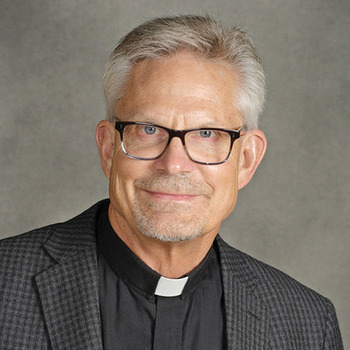-
 October 17, 2025“And Jesus said,‘There was a judge in a certain town who neither feared God nor respected any human being.’”(Luke 18:1)Though our Sunday’s gospel is about persistence of prayer, it lends us an opportunity to consider the integrity of Canon Law. Most Catholics witness Canon Law through the efforts of an individual who seek an annulment. And within our diocese the last few years, the legal steps taken to bring two or more parishes into one guided by Canon Law. But our Church and the Sacramental life of our Catholic faith is more than a legal entity, and yet Canon Law is essential to the backbone of what has been passed on for generations and what we have received, and in turn pass on.“Canon”is from the Greek word ‘kanin,’referring to a rule or standard. For two thousand years the Catholic faith has been passed on through trials, tribulations, and heresies; through the times of blessings, inspiration, creativity and justice. Canon Law has been the bond that has maintained the structure, kept intact the faith we have received and the faith we pass on. To guide the Church worldwide, laws are essential to maintain the unity of our teachings, dignity of the Sacraments, the proper care and use of our church properties, integrity of our liturgical celebrations, and the essential purpose of our‘mission.’Of the 1,752 codes in Canon Law, the final one succinctly describes the purpose and mission of our Church: “The salvation of souls, which must always be the supreme law in the Church, is to be kept before one’s eyes.
October 17, 2025“And Jesus said,‘There was a judge in a certain town who neither feared God nor respected any human being.’”(Luke 18:1)Though our Sunday’s gospel is about persistence of prayer, it lends us an opportunity to consider the integrity of Canon Law. Most Catholics witness Canon Law through the efforts of an individual who seek an annulment. And within our diocese the last few years, the legal steps taken to bring two or more parishes into one guided by Canon Law. But our Church and the Sacramental life of our Catholic faith is more than a legal entity, and yet Canon Law is essential to the backbone of what has been passed on for generations and what we have received, and in turn pass on.“Canon”is from the Greek word ‘kanin,’referring to a rule or standard. For two thousand years the Catholic faith has been passed on through trials, tribulations, and heresies; through the times of blessings, inspiration, creativity and justice. Canon Law has been the bond that has maintained the structure, kept intact the faith we have received and the faith we pass on. To guide the Church worldwide, laws are essential to maintain the unity of our teachings, dignity of the Sacraments, the proper care and use of our church properties, integrity of our liturgical celebrations, and the essential purpose of our‘mission.’Of the 1,752 codes in Canon Law, the final one succinctly describes the purpose and mission of our Church: “The salvation of souls, which must always be the supreme law in the Church, is to be kept before one’s eyes.
Like any functioning society, the Church needs laws to operate effectively.Rather than a bureaucracy guided by rules of intolerance or rigidity, Canon Law at its heart upholds mercy at all levels, fosters justice, and serves to guide the mission God intends: the salvation of souls. As the Church was established through the efforts and perseverance of the apostles and early disciples, the initial governance can be noted in scripture: Acts 1:15- 26 and Matthew 18:15-20. As our faith spread to different areas and cultures the convening ecumenical councils established various codes of canon law. Finally, through the efforts of Pope Pius X, a council established a unified and less complex code of Canon Law in 1917. As Pope John XXIII convened the bishops and theologians from around the world to convene in Rome, Vatican II restructured some of the canons to reflect a more‘open’Church. Finally, in 1983 through the efforts of Pope John Paul II Canon Law was restructured to reflect the central aspects of our Church and its mission, “the salvation of souls.”Of the seven sections or‘books’of Canon Law, the first five are the heart and soul of the Church’s mission and purpose. 1.General Norms: Establishes foundational legal principles and definitions, like the frame of a home. 2.The People of God: Defines the rights and duties of clergy, laity, and religious, and outlines the hierarchical structure of the Church. 3.The Teaching Function of the Church : Covers preaching, catechesis, Catholic education, and the authority of Church teaching 4.The Sanctifying Function of the Church: Regulates the sacraments, liturgical practices, and the norms surrounding marriage and worship.5.Temporal Goods: Manages Church property, finances, contracts, and donations with transparency and accountability. And the last two sections of Canon Law; Sanctions in the Church, and Processes.Opening the Jubilee Year of Mercy, Pope Francis provided an exhortation to consider how the law is established primarily for the purpose of justice:“Mercy is not opposed to justice but rather expresses God’s way of reaching out to the sinner… God’s justice is His mercy.” Healing, reconciliation, peace and hope is the direction Canon Law guides our Church, not merely as an institution but as the Body of Christ. Rev. Andrew Moss offered this insight on the fortieth anniversary of Pope John Paul II’s call to restructure the codes:“All of the baptized have a share in the mission of the Church, and so the Code is for every member of the faithful.” As my Canon Law instructor said,“if you are to error, error towards faith.”
God Bless, Fr. Tim
FYI: “Man's external form, marvellously constructed, is not much as compared with the divine soul that dwells inside that structure.” (Leonardo da Vinci
